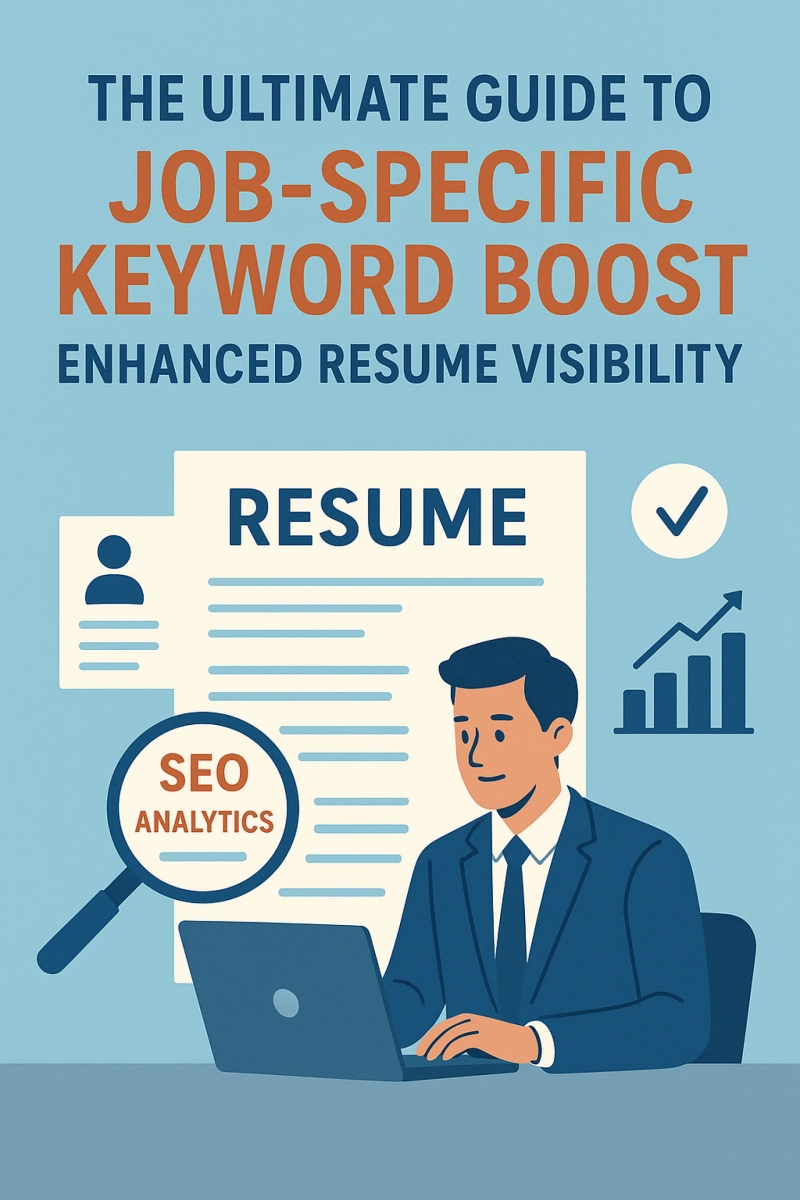In today’s competitive job market, sending out a generic resume is like whispering in a crowded room—you’ll get drowned out before hiring managers ever notice you. According to Glassdoor, the average corporate job opening attracts 250 resumes, yet only about 4–6 candidates get called in for an interview. The difference between those who stand out and those who disappear into the applicant tracking system (ATS) often comes down to one thing: job-specific keyword optimization.
In this guide, we’ll explore how strategic keyword use can dramatically boost your resume visibility, why hiring algorithms prioritize them, and how you can implement a smart strategy (without keyword stuffing) to improve your chances of landing an interview.
Why Keywords Are the Secret Weapon in Resume Visibility
Most employers use Applicant Tracking Systems (ATS) to filter resumes before they ever reach human eyes. These systems scan for keywords that match the job description—terms related to skills, qualifications, certifications, and industry-specific tools.
- Example: If you’re applying for a digital marketing role, the ATS may look for words like SEO, Google Analytics, PPC, and content strategy.
- Without these keywords, even a well-crafted resume could be discarded before a recruiter sees it.
In short, keywords are not just buzzwords—they’re gateways to visibility.
How to Identify Job-Specific Keywords
Crafting a keyword-boosted resume starts with research. Here’s how:
1. Analyze Job Descriptions
Look for recurring terms across multiple postings for the role you want. If five employers mention “project management software”, that’s a keyword worth including.
2. Use Keyword Tools
Leverage free tools like Jobscan or Indeed’s Job Trends to identify in-demand terms for your industry.
3. Focus on Hard Skills and Certifications
While soft skills are important, ATS often prioritize hard skills (e.g., Python, Salesforce, Six Sigma) and certifications (PMP, CPA, AWS Certified).
Where to Place Keywords for Maximum Impact
Once you’ve gathered relevant terms, strategic placement is key:
- Resume Headline & Summary: Showcase role-specific expertise upfront.
- Skills Section: Use a mix of industry terms and tools (e.g., Excel, SQL, Tableau).
- Experience Section: Embed keywords naturally by aligning them with achievements.
- “Reduced campaign costs by 30% using PPC bid optimization tools.”
- Education & Certifications: Highlight degrees, licenses, or special training with exact keywords.
Avoiding the Trap of Keyword Stuffing
Recruiters can spot keyword stuffing a mile away, and ATS algorithms are getting smarter at filtering out robotic resumes. Instead, aim for balance and readability:
❌ Wrong: “SEO SEO SEO expert with SEO skills in SEO marketing.”
✅ Right: “Experienced SEO strategist with expertise in keyword research, on-page optimization, and Google Analytics reporting.”
The Role of Mentor-Supported Resume Writing Help
While DIY keyword research is possible, many job seekers struggle to implement it effectively. That’s where mentor-supported resume writing help can make a difference. By working with a career mentor, you gain:
- Personalized guidance on keyword optimization.
- Insights into industry-specific language recruiters actually use.
- Professional formatting that ensures ATS compatibility.
With expert mentorship, your resume doesn’t just include keywords—it tells a compelling story that resonates with both ATS and hiring managers.
Real-World Example: Keyword Boost in Action
Consider two resumes submitted for a data analyst role:
- Resume A: Lists “data analysis” and “Excel” but misses terms like “SQL,” “Python,” and “Tableau.”
- Resume B: Highlights projects using SQL queries, Python scripts, and Tableau dashboards while tying them to measurable business outcomes.
Guess which one gets shortlisted? Resume B—because it speaks the language of both ATS and the employer.
Final Thoughts
Optimizing your resume with job-specific keywords isn’t just about gaming the system—it’s about positioning yourself as the ideal candidate. By understanding how ATS works, strategically placing keywords, and avoiding overuse, you’ll significantly boost your chances of landing interviews.
If you’re ready to take your career search to the next level, consider investing in mentor-supported resume writing help. With expert guidance, you can transform your resume into a powerful tool that opens doors to the opportunities you deserve.
👉 Start today—your next career move is waiting.



